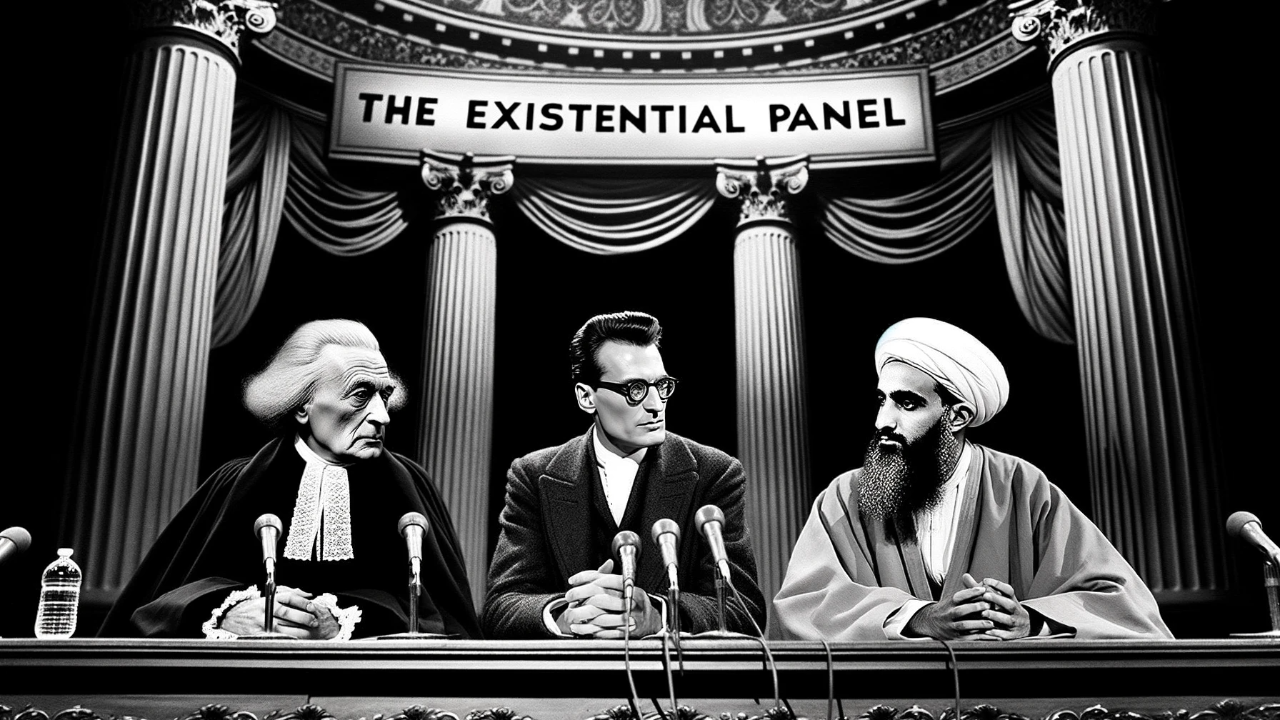
The Existential Panel Part I: A Dialogue with Kant, Sartre and Sina in Four Parts
Oct 13, 2023A large auditorium, equipped with a stage that has four seats. The audience is buzzing with anticipation. Seated amongst the audience are other dignitaries and speakers of the day including Nietzsche, Plato, Confucius, DuBois, Locke, Marx, Machiavelli, Socrates and Paine. Descartes is conspicuously absent.
Participants: Immanuel Kant, Ibn Sina and Jean-Paul Sartre. Dr. Ingram is the moderator.
Dr. Ingram: (Takes the stage and sits, gesturing for the philosophers to join him) Ladies and gentlemen, thank you for joining us for this momentous occasion. I am Dr. Arthur Ingram your moderator for this evening. We are here to engage with three of the most profound thinkers in history on a subject that touches us all—what does it mean to exist? Gentlemen, welcome. Let's dive right in. What, in your opinions, does it mean to exist?
Kant: Existence is a complex interplay between our perceptions and the noumenal world, the world "as it is." We can never fully grasp the thing-in-itself but only its appearances to us. In essence, to exist is to be a subject experiencing phenomena within a framework of space, time, and causality.
Sartre: I appreciate the notion of phenomena, but for me, existence precedes essence. To exist is to be thrown into the world without consent, and it is up to the individual to define themselves through their actions and choices. Existence is an ongoing act of self-definition.
Ibn Sina: While I respect your positions, I would argue that existence is a contingent reality emanating from a Necessary Existent—God. Existence is a stage where essences manifest through divine will, and the journey is to recognize and reconcile with this ultimate truth.
Dr. Ingram: Fascinating opening thoughts. Kant, how do you respond to Sartre's assertion that existence precedes essence?
Kant: I find it an intriguing argument. However, how can we talk about choices and actions without presupposing some categories or frameworks that allow us to make sense of these actions? Don't we require some form of "essence" to even perceive or enact "existence"?
Sartre: Ah, but these frameworks you speak of are human- made. Even if they are 'a priori' conditions of human thought, they are still aspects of human existence. Therefore, they don't precede existence but are a part of it.
Dr. Ingram: Ibn Sina, you speak of a Necessary Existent— God—as the foundation for all existence. Would you say this is an "essence" that precedes existence, contrasting with Sartre's view?
Ibn Sina: Precisely, Dr. Ingram. The Necessary Existent provides the ground upon which all contingent beings stand. The essence of this Being indeed precedes existence, not only conceptually but also ontologically.
Sartre: But why should we accept a predefined essence? Isn't that a way to escape the responsibility of defining oneself?
Ibn Sina: The responsibility of recognizing the Necessary Existent is the ultimate quest. It's not an escape but a divine imperative.
Dr. Ingram: It seems we've only begun to scratch the surface, but this has been an incredibly enlightening exchange. Let's take a brief recess and come back for more.
End of Part I.
-------------------
Did you enjoy this blog? Check out other blogs at The Socratic Algorithms

